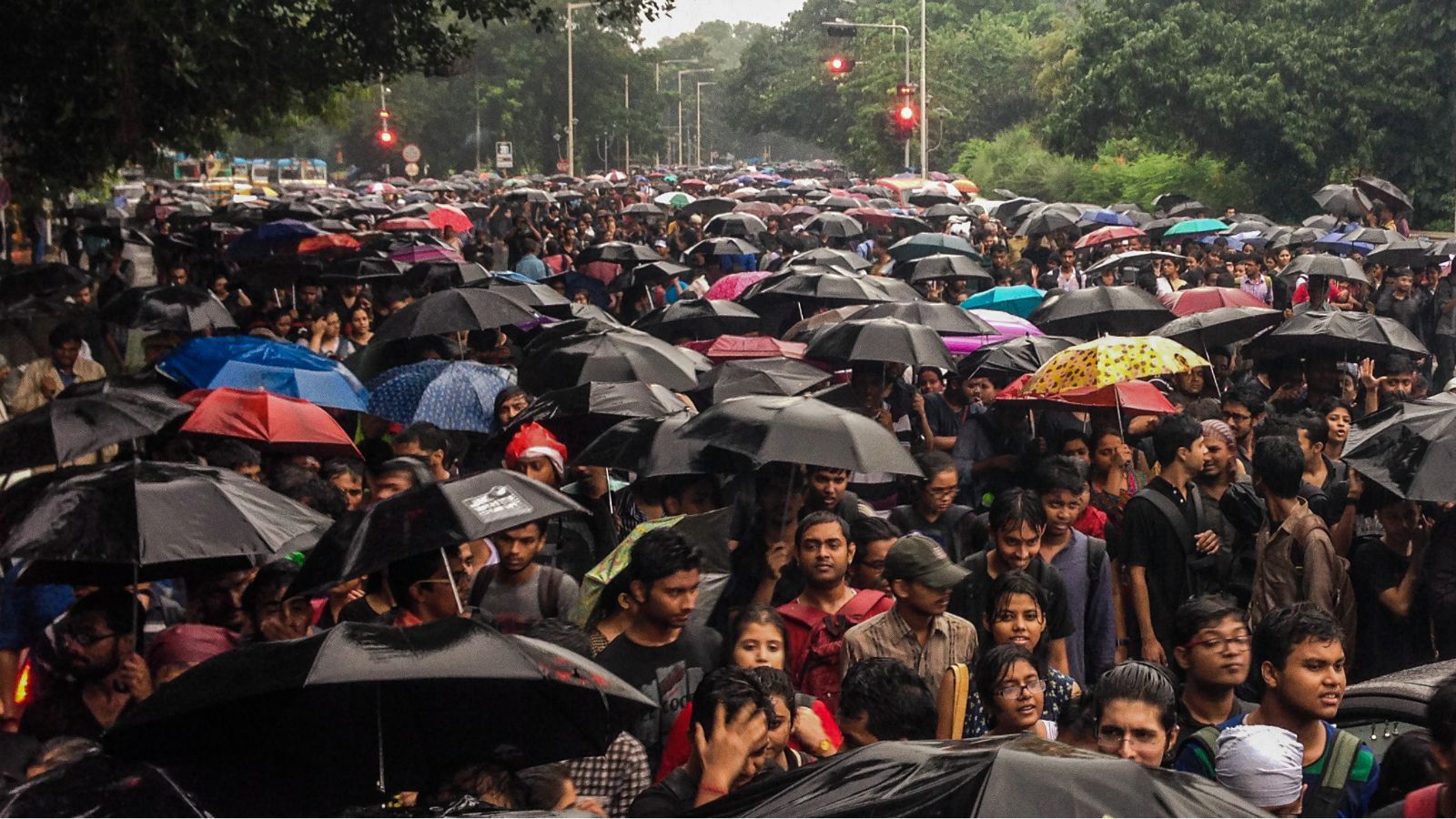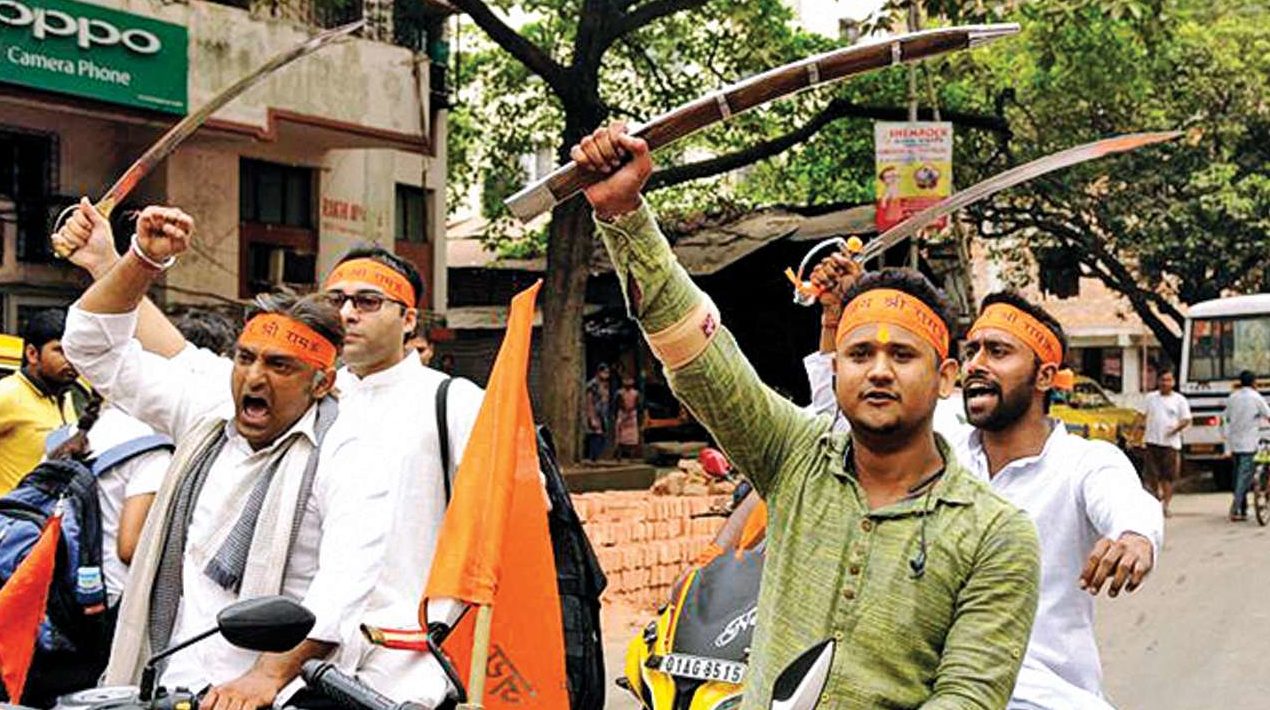In this essay, my aim is to briefly touch upon the ‘self’ or the essential characteristics of Bengal that makes the politics of The Bharatiya Janata Party (BJP) fundamentally opposed to the intrinsic ‘character’ of our state.
I wish to do the analysis, under three sections: Power, Socialism and Culture.
Power
Bengal is the rebel in the recent political history of India. For over 40 years – except for a brief spell when the ruling Left was supporting the UPA-I – Bengal is at opposition with whichever party is running the country from New Delhi.
The ‘anti-Centre’ mindset is woven with the modern consciousness of Bengal. And this instinct extends out in the global context as a deep rooted anti-hegemonic sentiment.
When US Secretary of State Hillary Clinton came over to Kolkata to meet Chief Minister Mamata Banerjee – after Didi had broken the 34 year old Left rule in 2011 – the Trinamool Congress (TMC) government was rumoured to be as cold to her as The Left.
Once I nearly missed a flight while being caught in a traffic jam because an anti-imperialism march had been organised by the Left Government against the Bush’s war on Iraq in the pretext of – later proven to be false – Weapons of Mass Destruction.
Some years back, The Left government also cheekily changed the official name of Harrington Street to Ho Chi Minh Sarani because the U.S Consul General was located on that street.
They wanted the U.S Consul General in Kolkata to forever remember Vietnam.
The 1970 film Pratidwandi (Adversary, Opponent or Competitor) by Satyajit Ray was based on the novel by Sunil Gangopadhay. It was the first film of Ray’s celebrated Calcutta Trilogy.
In that film, a job interviewee – Siddhartha: an educated middle class young man amidst social unrest and rampant unemployment – is asked about the most important event of the times. He says that more than the moon landing – that was more a matter of time and would have eventually happened – the defeat of the U.S.A in Vietnam because of the heroic fight by the Vietnamese men and women, inspires him the most, and he deems that to be more significant.
Kolkata loves the victory of David over Golliath.
The present address of the U.S Consul General in Kolkata is 5/1 Ho Chi Minh Sarani, Kolkata – 7000071.
*
Bengal is not enamoured by ‘big power’; her instinct is to remain cold, be sceptical and to oppose it.
But the mindset of The Bharatiya Janata Party (BJP) is totally opposite. Being a patriarchal party, The BJP is more hierarchical in its mindset that is conditioned to bow before ‘superior’ power, tolerate dictatorial ethos and obey commands without questioning authority.
Most of the political parties of India suffer from a deficit of internal democracy, but the BJP’s fundamental trait of Brahmanical patriarchal conservatism makes it extremely conscious of power, status and hierarchy.
The BJP’s enthusiasm for big power is also reflected by the shift of India’s traditional non-aligned foreign policy towards the imperial axis of US-Israel and the generous – and often awkward – hugs that Prime Minister Narendra Modi reserves only for the ‘big’ leaders, while going cold before the ‘lesser’ ones.
*
In September 2014, a historical apolitical march by citizens of Kolkata rattled the TMC government of West Bengal. Thousands of people on a rain soaked Saturday afternoon – fighting for civil liberties, freedom from authoritarianism and demand for justice – managed to shift the mind of the Chief Minister.
The spontaneous outpouring of dissent – organised via social media – stemmed from several pent-up issues and certain incidents pertaining to Jadavpur University aka the #Hokkolorob movement.
The 2014 dissent brought about a welcoming change in the attitude of the TMC government, who went on to win by bigger margins in 2016 Assembly Elections.
I was also one of the protesters in the grand march. That day, it convinced me that Kolkata, and also Bengal, won’t hesitate to stand up against any power/authority that has swayed from a liberal and progressive ethos.
People will organise, dissent and hit the streets. It is not possible to intimidate Bengal with power.
Socialism
Economic and social benefits must percolate to all, not just a few, is a prime understanding of modern democratic socialism.
Socialism is the default mode of Bengal; even the present TMC government is ‘left of centre’ in key policies.
In the recent past, Bengal has proven that she won’t overlook the rights of the farmer, the villager and the tribal in favour of feudalism and corporate interests.
The land reforms of the Left in the 1970s that transformed rural Bengal entrenched them in Bengal for three decades. But one of the major factors which dethroned The Left from power was also related to fertile land and farmers. The Left government overlooked the rights of the farmers and gave fertile land to the Tatas in Singur; a factory on unfertile fallow land would have been a non-issue.
Bengal instinctively expects pro-people policies from the government; she desires a strong social consciousness from the policy makers that aims to improve the Human Development Indices along with the GDP and other parameters.
*
Bengal also largely refuses to put material profit, as the highest goal of human life.
This attitude has been fostered due to the history of our state from the time when the ‘Bengali’ identity – language and earliest culture – appeared under the Buddhist Pala dynasty, and got influenced by the Bengal Renaissance and the subsequent socio-political history.
The technocratic pro-corporatism neoliberal capitalism – practised by the BJP – doesn’t synchronise with the general mindset of Bengal.
Everything in Bengal, and in Kolkata, is also not all about transactions and deal making – humanity still matters; life still surprises.
Culture
Looking at the present day India, if someone asks me about the foremost asset of Bengal, I will say it is the ‘liberal socialist consciousness’ that is blended with a ‘secular culture’ and an ‘ethos of cosmopolitism’.
This is a priceless asset in midst of the far right Hindutva cultural tandav in India.
Bengal has successfully resisted the right wing since 1947; the rightwing mindset and ideology haven’t had any significant political success till the boisterous arrival of the RSS-BJP post 2014, and the raising of the Hindutva pitch in the last couple of years.
(There is a support base for right wing politics in Bengal; but that percentage is not over than 10% of the polled voters, as per the latest figures: the Assembly Elections of 2016.)
I have written more about the culture of Bengal – especially the religious history – in the context of the challenges Bengal is facing now with the arrival of right wing politics.
So instead of repeating them, I prefer to give the links of the three articles, related to the topic, which were published in The Wire and The Daily O: In Bengal, Hindutva Confronts Two Icons – Tagore and Fish, Planned Basirhat riot: Will Bengal fall to BJP-RSS’ communal designs? and Ram Navami violence: Why Hindutva forces are fanning communal flames in West Bengal
Conclusion
One of my high school friends – who is now a bhakt of Prime Minister Modi and supports the RSS-BJP – asked me a question.
He asked me, ‘I know that the BJP will get 50% of the Lok Sabha seats from Bengal in 2019 and will win 2021 Assembly Elections by a huge majority. Do you also you think the same?’
I didn’t bother to answer the question and remembered what Ritwik Ghatak had once told a journalist just before an interview: please ask sensible questions only.
*

Unlike my friend, I don’t think that the RSS-BJP is gaining any ground in Bengal presently, in spite of the ‘media events’ like Ram Navami processions with swords and tridents and the silly #SaveBengal campaign by the BJP.
For the RSS-BJP to gain ground in Bengal, the very ‘self’ or the essential characteristics of Bengal need to change.
The RSS-BJP understands that and they have embarked upon a ‘social engineering’ mission based upon Hindi-Hindu-Hindustani plank. And I don’t think, this ‘mission’ will succeed anytime soon.
I will be surprised if the BJP manages to get 1 or 2 seats in the upcoming General Elections 2019.
However, it will be a setback for Bengal if the BJP manages to become the opposition party in Bengal by pushing out the Left. Hence, the Left, and even the Congress, have to remain as the main opposition force to the TMC. This is of great importance to prevent the ‘cultural transformation’ of Bengal that the RSS-BJP wishes to accomplish.
*
The ‘cultural transformation’ – being attempted – is based upon two things: devotion – based upon religious identity – and indoctrination – of Hindutva ideology via angst, fear, hate and anger.
Blind devotion and wilful indoctrination can alienate one’s mind from reality and produce a false sense of the world – this we all know.
But when truth itself is grossed over due to the ideological lens one wears over the mind, it becomes tragic and dangerous.
If we support lies, unfairness and injustice due to our ties and biases, then we will drag ourselves and the nation further down into the abyss of moral and spiritual degeneracy that we are witnessing now.
The ethical deficit of the Indian establishments – the government, the democratic institutions, the media, the corporate world and the judiciary – haven’t been so alarming, as it is now.
In order to do the much required course correction, we need to put truth, fairness, honesty and justice ahead of ideological affiliations, community feelings and religious sentiments.
Hence, the strategy of the Hindutva forces to penetrate Bengal on the back of lies, unfairness and injustice – fake news, false narratives and communal violence – will only do great damage to Bengal and her prospects.
RSS-BJP is alien DNA; it has nothing better to offer to Bengal.
RSS-BJP is an antithesis to the history and culture of Bengal.
Bengal needs to keep RSS-BJP away for the sake of itself and for the sake of our Constitution, our sovereignty, our democracy and our nation.
[The views expressed belong solely to the author, and may not reflect the opinions of the editorial team]

